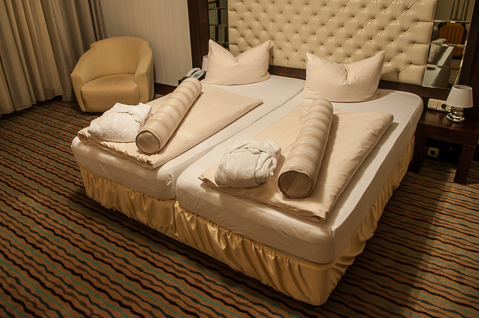TEN (10) GERMAN TRADITION YOU HAVE NEVER HEARD BEFORE
While relocating to a new country, I believe it is my duty - as a newcomer - to get acquainted with the local customs and traditions and - as a citizen of the world - to satisfy my thirst for general knowledge and culture. Not even a whole year has passed since I relocated to Germany, and I have already learned a lot about some of the weirdest traditions this country offers. This text presents the ten German practices you have never heard of as a regular tourist passing through the region for a few days would typically not have the chance to be exposed to them.
1. KNOCKING ON TABLES
Knock, knock! Who's there? In Germany, it is customary to hit knuckles on a table - instead of clapping - at the end of a presentation. I have to admit; it did surprise me the first time it happened as I was always used to see professors do this to order silence in a class. And yet, now it is instead used as a positive habit. The origin for that custom is purely academic, although it is now spread through any situation involving a presenter and a crowd. I've witnessed it many times, even at the office.
2. NUDITY
There are over 900 registered spas in Germany. Needless to say that Germans seem to take their spa culture very seriously. Throughout German history, thermal springs have been frequented by all classes of the population. Regardless of the social status, if there is one element in life that reduces all human beings to a common denominator, it is the fact that we all look the same while naked. Germans seem to be entirely in sync with this philosophy. It is highly frowned upon to enjoy a day at the spa without embracing the Freikörperkultur (free body culture) naturalist philosophy. Many Europeans, and mainly Germans, find it incredibly joyful to experience relaxing activities nude.
3. GROUCHING
Germans love rules. But, what they enjoy even more than rules is correcting those who do not comply with them. For example, the Montrealer I once find himself jay-walking in the middle of Nuremberg at 3:00 in the morning. The city was dead! No cars, no bicycles, nothing! And yet, a lady standing next to me at the red light could not help but yell at me because I was breaking the law.
Another example could be when I once found myself in Munich on the way to the Allianz Arena for an FC Bayern München football game. My friend Phil was here on business, and we have arranged to watch a game during his stay. On game day, we have decided to get to the stadium using public transportation. As we were riding the stairway to the U-Bahn deck, a lady just decided to push me in the back to indicate that it goes against the socially accepted rules to stand on the left-hand side of the stairway. She did not excuse herself, tap me on the shoulder or even try to catch my attention in any way. She just deliberately decided to punch me hard on the back for me to move away for her benefit.
4. #NOFILTER
Any stranger to the German character knows how they can be direct while talking to you. For them, talking is all about efficiency. It is a mathematical fact that the shortest path between two points is and will always be the direct line. Therefore, there is no possible small talk while discussing with a German. No fluff, no embellishment, no unnecessary words in a conversation. I can make my peace with that, although being Canadian makes it extremely difficult to understand as we are at the opposite of the spectrum with our legendary politeness. I find it extremely difficult when I am asked to change my natural behaviour and shut down my courteous habits as it is being seen as fake or even suspicious. I understand that local customs might be very different from one country to another. Still, I find it highly odd in today's society that someone can't make an effort to understand that people from different countries might act in a slightly different way based on their very own experience of life on the other side of the globe. I mean, are Germans so narrowminded that they omit the existent of different cultures?
5. SEPARATE MATTRESSES
This custom might sound contradictory considering the German people is so comfortable with nudity. Nevertheless, I think you will be very much surprised (and at the same time, not so much) to learn that German beds are constructed in a way that a queen size bed is composed of a queen size frame with two single mattresses on top of it. This means that a typical German couple sleeps in the same bed but on totally separate mattresses with their own set of linen and drapes. When I first saw this German bed in my relocation apartment, the first thought that has come to my mind was: "How do they have sex?". As it turns out, an extensive conversation with my relocation agent taught me that sleeping on separate mattresses is more efficient and better for a good night's sleep! Boy, was I "surprised" by this answer! When it comes to the sexual act, Germans only cross the midline formed by the crack between the two mattresses when the time is right to engage in such an extracurricular activity. Outside of these hours, each member holds on to their respective turf. In other words, the rule is: if your mattress tilts to towards the inner part of the bed where the crack is located, it means it's "sexy time" (as Borat would say)!
6. The Christmas Pickle (Weihnachtsgurke)
As I was visiting Munich with two friends from Montreal, one of them mentioned that his neighbour gave him a clear mission to bring back a Christmas Pickle from Germany. What is a Christmas Pickle, you will ask? Well, it's an ornament used on the Christmas Tree. I would not believe him and even asked to double-check with his neighbour to see if she meant. After all, I have never heard of this custom despite living in Germany. But, the request was accurate at the first formulation. This tradition is probably one of the weirdest modern Christmas customs. Therefore, I have tried to trace its origin. As it turns out, the Christmas Pickle is an ancient German tradition. It is the last ornament to be hung on the Christmas Tree. Once the trim was finally suspended, a game would start where the children would find the pickle in the tree. The first child to find the pickle got an extra present. If you don't believe me, google "Pickle Germany" and see yourself what images will come out! Though, the German obsession with pickles does not stop here! I found out while once preparing my Sunday morning brunch (two pouched eggs on an English muffin topped with smoked salmon, slices of tomatoes and shredded gouda) when one of my roommates said it looked delicious. But it would be perfect if I added a pickle on top of it! How horrified was I when he suggested bonifying my creation with such vulgar produce! Then, I discovered that Germans truly shove pickles on anything, as long as it is edible.
7. FATHER'S DAY
In Germany, Father's Day takes place only a few days before Mother's Day respectively, on May 5 and the second Sunday of May. The Father's Day I am accustomed to goes pretty much on the down-low and is not necessarily celebrated. Moreover, in the very few cases where it is observed, the celebration in question consists of offering a tacky tie the father can shame himself by wearing it at work and a generic wish card bought at the dollar store. It remains an occasion for family members to gather together and perhaps enjoy an excellent barbecue in the backyard. In Germany, the experience is different! Here fathers gather together far away from any family member and get shitfaced all day long! I already knew that Germans usually take any occasion in life to get drunk, but spending Father's Day amongst fathers so they can drink their tears sounds a bit sad to me. It's almost as if they never chose to accept their fatherhood mandate and need this day to get through the rest of the year. I sincerely hope I'm wrong!
8. ACADEMIC FENCING (AKADEMISCHES FECHTEN OR MENSUR)
Fencing is a traditional practice in several European countries (Germany, Austria, Switzerland and Estonia) that consists of sword slashing between two male members of different fraternities. Modern academic fencing is neither a duel nor a sport. It is a traditional way of training and educating character and personality without a winner or a loser. In contrast to sports fencing, the participants stand their ground at a fixed distance. The fence is at arm's length and stands more or less in one place while attempting to hit the unprotected areas of their opponent's face and head. Flinching or dodging is not allowed, the goal being less to avoid injury than to endure it stoically. In other words, you slash your fraternity rival in the face and pray to be the one who gets the least visible wounds at the end of the duel.
9. WISHING "HAPPY BIRTHDAY" ON THE DOT
Germans only wish a happy birthday on the actual birth date. Giving your best wishes to someone even one minute too early is highly frowned upon. People will get offended and even mad at you because they believe it will bring them bad luck forever. Germans strongly believe that wishing someone a happy birthday early could mean they won't have one, or more precisely, that they'll die. As they say: "Du sollst den Tag nicht vor dem Abend loben," which translates into "You shouldn't praise the day before the night."
10. BRINGING YOUR OWN CAKE
Who brings the cake, then? This very last tradition was a big surprise to me as I was celebrating my 29th anniversary. This was my first birthday on German ground. I was only three months in and realized that the birthday celebrant is responsible for bringing his own cake to the office. On top of it, I was also commuting to the office with my road bike. Could you imagine me shoving my birthday cake into my commuting backpack to bring it to work? I sure don't! Luckily, one of my colleagues anticipated my lack of knowledge about this tradition and brought a cake on my behalf. I think it's fair to say she saved the day!



